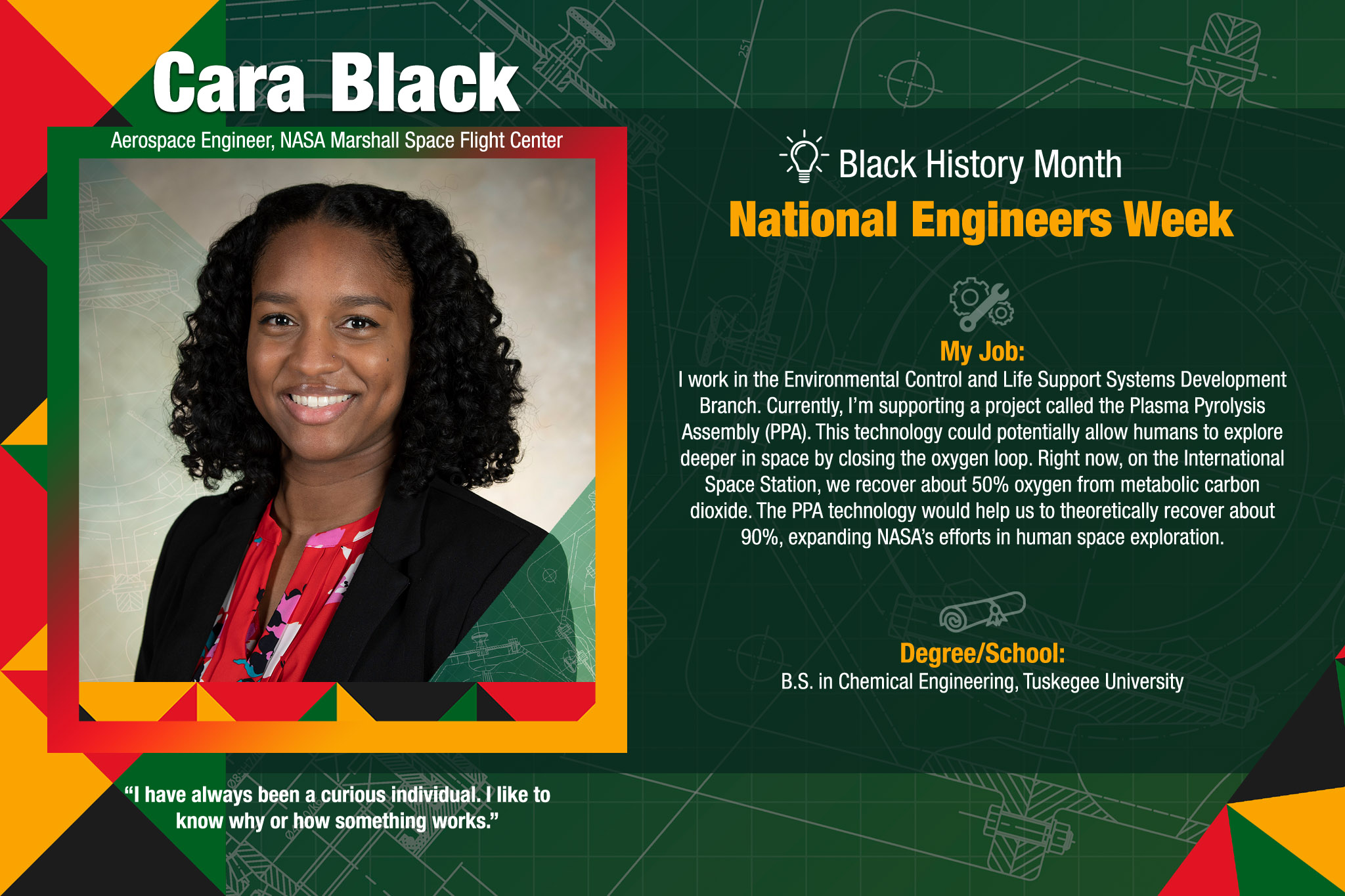Cara Black is an aerospace engineer with a Bachelor of Science degree in chemical engineering from Tuskegee University who has worked almost five years at NASA Marshall Space Flight Center.
What is your job and how do you support the NASA mission?
I work in the Environmental Control and Life Support Systems Development Branch. Currently, I’m supporting a project called the Plasma Pyrolysis Assembly (PPA). This technology could potentially allow humans to explore deeper in space by closing the oxygen loop. Right now, on the International Space Station, we recover about 50% oxygen from metabolic carbon dioxide. The PPA technology would help us to theoretically recover about 90%, expanding NASA’s efforts in human space exploration.
Who or what inspired you to choose your career and why?
I have always been a curious individual. I like to know why or how something works. I think my parents (both retired NASA engineers) could see that from an early age and thought I would enjoy a career in STEM (Science, Technology, Engineering and Math).
When my parents would let my sister and me participate in Take Your Children to Work Day, I would be in awe while taking tours of the labs and test stands. Once, my mom had the opportunity to let us witness a launch, and that’s when I knew I had to work for NASA. It was the most incredible thing I had ever seen!
What do you find most rewarding about being an engineer with NASA?
I find it most rewarding to work with a diverse group of people, coming together to solve challenging problems. Everything in engineering/science does not go the way you would expect the first time – but learning from failure with a group of motivated individuals helps keep me motivated.
What do you find most challenging about your job?
I work in research and development, therefore, most of the technologies that we are developing have never been created before. The job is inherently challenging, which makes it exciting and enjoyable.
What do you enjoy doing outside of work?
I love spending time with my family. My husband and I have three children, Mavis who is 3 years old and we recently welcomed our twins, Cruz and Koda, to the family about six months ago. As you can imagine, there are a lot of musical jam out sessions in our living room. When I have free time, I enjoy photography, creating arts and crafts with my smart cutting machine, and reading self-improvement/self-development books.
You graduated from an HBCU (Historically Black College or University). Why was this important to you and what was most meaningful about your experience?
My mom graduated from Tuskegee Institute (later renamed Tuskegee University). Growing up she would take us to homecoming, which is where my love for the school started. Also, my sister attended Tuskegee University. I remember visiting her one week out of the year while in high school and experiencing college first-hand.
I felt it was important to attend Tuskegee University because the school has a reputation for providing quality graduates that are highly recruited by top engineering companies. As with most HBCUs, I believe the smaller student-to-teacher ratio helped facilitate a more intimate experience and provide the support I needed to successfully graduate.
Do you think diversity and inclusion are important for NASA to achieve success?
Absolutely! Diversity and inclusion allow for more variety of perspectives, which ultimately leads to a larger platform of innovation and creativity. If we are going to achieve NASA’s mission, then we need to have all hands on deck. That means all ideas should be on the table as well.
In February, we celebrate Black History Month. Who has inspired you the most in Black history and why?
George Washington Carver has always been an inspiration to me, from his innovativeness in agriculture to the way he treated people. He didn’t dwell on the tragedies of his own life. Instead, he focused on how he could help others.
One of my favorite quotes of his is: “There is no short cut to achievement. Life requires thorough preparation – veneer isn’t worth anything.”
What advice would you give young people who might be interested in pursuing a career in STEM (science, technology, engineering, and math)?
One key thing I found is that you must be able to work with others. Being a team player is essential. Most people think that you only need to know the science, principles, and theory. However, I found that knowing the basics will get you far but knowing people will get you further. Work on developing strong empathy skills and building quality relationships.

























